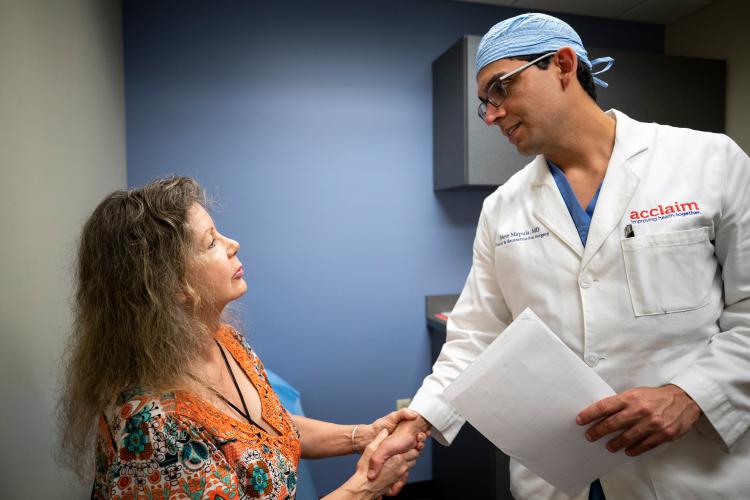
When a patient emerges from emergency trauma surgery, stabilized, it's an important milestone in their recovery. But it's not the end of their journey. It's the same for a person who gets to ring the bell in the Oncology and Infusion Center after winning their fight against breast cancer.
In many cases, the patient's recovery isn't complete until their body is restored to looking as much as possible like it did before their health emergency began. Sometimes, the operation to save the patient's life is just the beginning of the healing process.
"When a person has been involved in a traumatic car crash, and they've had their body altered because of it, or when a woman has a double mastectomy because she had breast cancer, it's very difficult for them to look in the mirror and not see the same person they have seen their whole life," said Plastic and Reconstructive Surgeon Dr. Steven Mapula. "What we do is try to make them as close to the way they were before their health issues. After their lives are saved, we try to give them their life – their sense of personal identity – back."
Mapula works in concert with Heather Schuster, a physician's assistant at JPS Health Network, who specializes in wound care. They develop and execute plans to restore the skin over the site of a wound. It's a process that sometimes takes several surgeries and almost always requires several follow-up visits to Schuster's office to complete.
To restore skin, Mapula said he sometimes has to sew it together one thin layer at a time, beneath a microscope. When that happens, it can take a very long time for the wound to heal. But the end result is worth the wait.
In addition to working with plastic surgeons after reconstructive surgery, Schuster also works with patients referred to her with sores that won't heal because of chronic health problems, including diabetes.
"It's incredible how much wounds are affected by things like smoking," Schuster said. "We try to fix the source of the problems, to make patients healthier as a whole. That's a key in wound care."
When you can make someone feel whole again, it's very special.
Seeing patients through to the end of their journey to wellness is something that many of the other caregivers at JPS don't have the opportunity to experience, Schuster said. When a patient comes into Trauma, and their life is saved, they move on to another area of the hospital for continued care. Meanwhile, trauma doctors and nurses move on to care for the next patient. They rarely get a chance to talk to the person whose life they saved.
"The fact that we work with our patients for a while and see them through to the end of their care is something that allows us to develop a bond with them," Schuster said. "When someone has been dealing with a messy, inconvenient wound for weeks or months, or when they've been waiting to see how things turn out after reconstructive surgery, they're unbelievably happy when they're finally back to the way they want to be. This can be a very rewarding job." Mapula agreed.
"When you can make someone feel whole again, feel like who they were before their accident or their surgery, it's very special," Mapula said.
For more information on reconstructive plastic surgery and wound care at the health network, listen to The JPS Podcast here.
Postponed since March by its COVID-19 response, JPS will resume performing non-emergency surgery on Tuesday, May 26, including reconstructive procedures. Care will soon continue for people who have been patiently waiting for two months to complete the healing process. Those whose surgeries will not require a hospital stay will be part of the first phase of reopening elective surgery. They will be contacted, in the order of their original scheduled date, to get their procedures completed.
